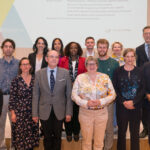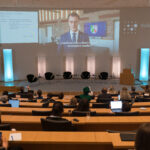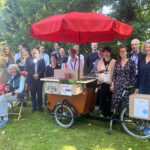
Download
Veranstaltungsort
Xplanatorium Herrenhausen, Hannover, Germany
Anmeldung
This is a past event.
DIJ Mailing List
Please subscribe below to stay informed about our research activities, events & publications:
Loneliness as a Social Phenomenon: Cross-Cultural Approaches to a Human Condition
11. Juni - 13. Juni 2025
Organized by:
Celia Spoden & Carolin Fleischer-Heininger, German Institute for Japanese Studies (DIJ) Tokyo, Japan; part of the Max Weber Foundation, Bonn, Germany
Sachiko Horiguchi, Temple University, Japan Campus, Tokyo, Japan
Aaron Hames, The Chinese University of Hong Kong, Hong Kong
Post-event report by the organizers
From June 11 to 13 the Volkswagen Stiftung hosted a thematic week on “Tackling Loneliness” at the Castle Herrenhausen in Hannover, Germany. According to the Volkswagen Stiftung, the relevance of the topic was reflected in the numerous high-quality applications submitted in response to the call for symposia. Instead of organizing one theme week with four symposia as usual, the foundation scheduled two theme weeks this year. We participated in the first in which there were four parallel symposia. The other symposia focused on democracy and loneliness (Janosch Schobin, Kassel University), integrating national and international perspectives on research and policy priorities (Maike Luhmann, Bochum University) and loneliness among young people in Africa (Shuyan Liu, Charité Berlin).
Our symposium, organized by Celia Spoden and Carolin Fleischer-Heininger (DIJ) together with Aaron Hames (The Chinese University Hong Kong) and Sachiko Horiguchi (Temple University, Japan Campus) addressed loneliness as a social phenomenon, drawing on cross-cultural and interdisciplinary approaches. We started from the premise that loneliness is a basic human condition. However, its increase and chronic manifestation have become a growing social problem in many societies. The anthropologist Chikako Ozawa-de Silva, for example, argues that structural changes and social transformations can increase the prevalence of loneliness. In her book The Anatomy of Loneliness (2021), Ozawa-de Silva discusses lonely societies that “make[s] people feel uncared for, unseen, and unimportant” (p. 5). Following this approach to loneliness we explored over three days structural components of society that can lead to loneliness as well as how civil society can offer remedies.
Since loneliness and social isolation are global issues, we invited scholars based in different countries to examine the phenomena and discuss approaches for remedy in diverse social contexts. Besides European perspectives, we had a special focus on Japan and South Korea. These two countries are of particular interest since loneliness and social isolation in Japan and South Korea have attracted widespread public attention. Both societies are experiencing rapid aging with a rising share of older adults living alone as well as the issue of extreme social withdrawal of younger adults.
Our first session opened with an anthropological approach to loneliness and lonely societies by Chikako Ozawa-de Silva (read by Aaron Hames on behalf of Chikako Ozawa-de Silva, who was unable to attend), followed by emergency room physician and bioethicist Zohar Lederman who discussed the “Ethics of Loneliness”. Carolin Fleischer-Heininger concluded the session with a talk on loneliness becoming a best-selling mega-trend of contemporary Japanese literature.
The second session focused on technological solutions to loneliness and social isolation. Hirofumi Katsuno presented a paper he co-authored with Daniel White on findings from their project on companion robots, artificial emotional intelligence, and loneliness in Japan. Next, Marit Haldar and Maja Nordtug introduced two technological devices developed by a Norwegian company to tackle isolation among older people and children who cannot attend school in person for a prolonged time due to childhood illness. Celia Spoden added a comparative perspective on avatar robots in Japan and Germany, exploring the possibilities of social participation for people with disabilities and chronic illness.
In the third session on “Loneliness and Social Isolation in Old Age” Heesun Shin and Chihyung Jeon gave a talk about a robot-doll, distributed by social workers in South Korea to older adults who live alone as a preventive measure to loneliness. In the following talk, Aaron Hames provided a counterpoint from Japan, examining a case in which aging medical cooperative members opt for face-to-face interaction instead of technological aids. In this session’s final presentation, Iza Kavedžija examined multiple ways older people try to ward off loneliness and create communities of care, craft relationships of support, cultivate relationships with more-than-human entities, and remain engaged in a community organization in downtown Osaka, Japan.
The second day started with a session on “Perspectives on Loneliness and Social Isolation from Disability Studies, Psychosocial and Healthcare”. Jan Steffens and Thomas Hoffmann gave an overview of historical and current perspectives on the relationship between disability and isolation. They emphasized the significance of the link between isolation and disability for the elaboration of a theoretical framework towards a further understanding of human development. Following their paper, Sachiko Horiguchi discussed preliminary findings from her collaborative, interdisciplinary study on the narratives of social workers tackling social isolation in Japan, Germany, UK, and Sweden and explored the relationships between social isolation and welfare policies. Sebastian Hofstetter closed the session with a presentation on burnout and workplace-related social isolation in Japan, examining digital health information and its potential contribution to digital health literacy.
The next session provided a practitioner’s perspective: Birgit Redlich gave insights and a workshop based on her experience as coordinator of “TOGETHER against the RIGHT. Experiences of loneliness as a catalyst for democratic distance and authoritarian attitudes at vocational schools in Germany?”, a BMFSFJ-funded program to empower young people from diverse educational or migrational backgrounds in structurally weak areas, who experienced discrimination and loneliness during the coronavirus pandemic. This provided an opportunity for all participants to reflect on loneliness and social isolation from a personal perspective.
In the afternoon we went on a field trip to the Arbeiterwohlfahrt Region Hannover e.V., where Silke Oppenhausen and Stephanie Böhm together with one volunteer introduced the project “Growing older in the midst of it all – active on-site” to support older adults from the neighborhood who are at risk of loneliness. The accounts illustrated the importance of meeting places and low-threshold activities such as game afternoons, cooking classes, lunches, coffee and cake, joint excursions, a coffee mobile, playing boules at weekly markets in the neighborhood, as well as “just listening,” for bringing people out of their loneliness.
The second day concluded with a joint program for all four symposia, where our participants Heesun Shin and Chihyung Jeon screened their documentary “Hug Me Tight: A Robot Story.” The film and their questions to the audience – whether robots can make people feel less lonely and if so, whether we will call this a success – provoked a lively discussion among the audience on technological solutions to loneliness.
On the last day, our three chairs – Evelyn Schulz, Felix Spremberg and Wolfram Manzenreiter – commented the symposium from their perspectives and highlighted themes for the following group discussions on how societies can become more inclusive and reduce loneliness and social isolation. In our concluding session, we discussed our plans for publication of our papers and the creation of a scientific blog with teaching materials for universities on loneliness and social isolation.



